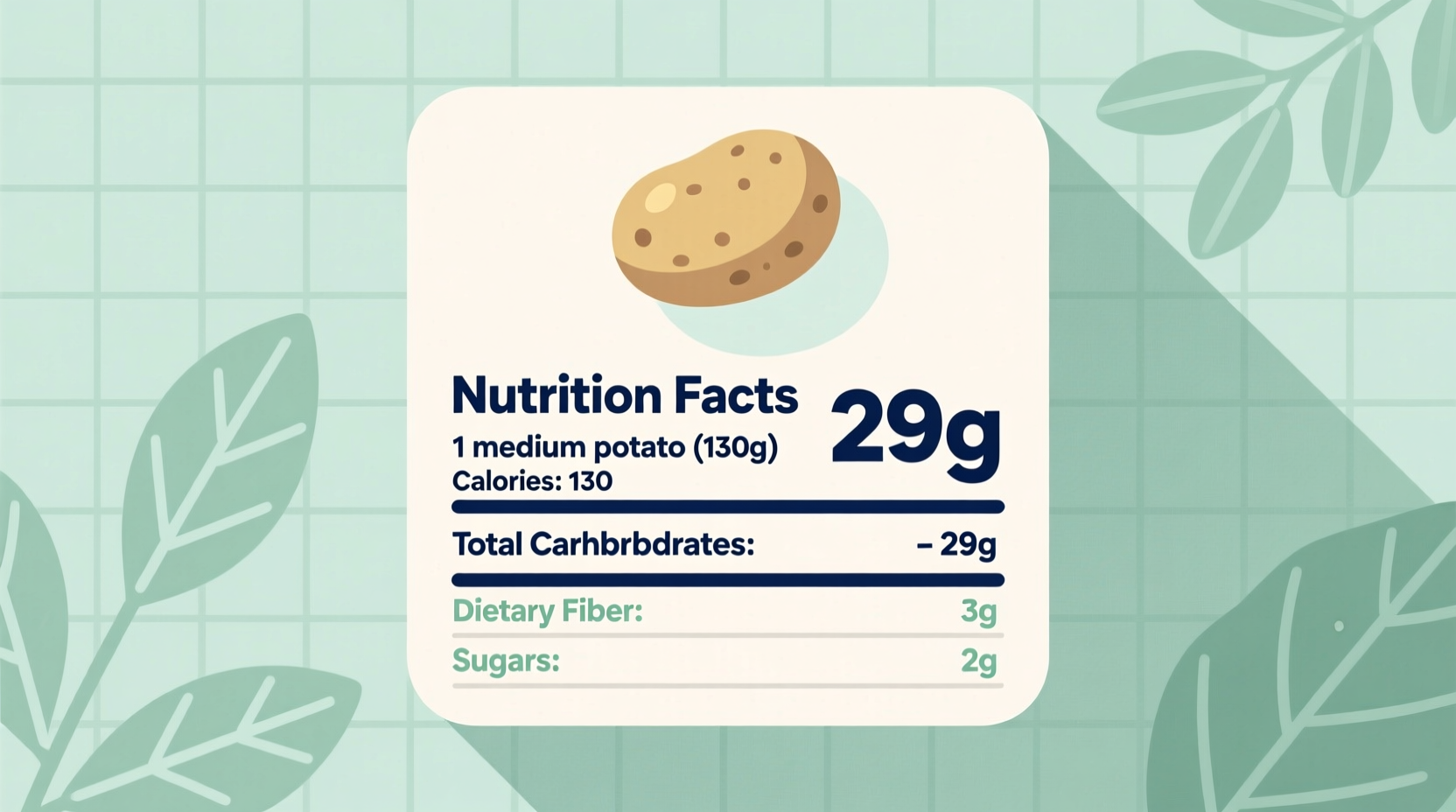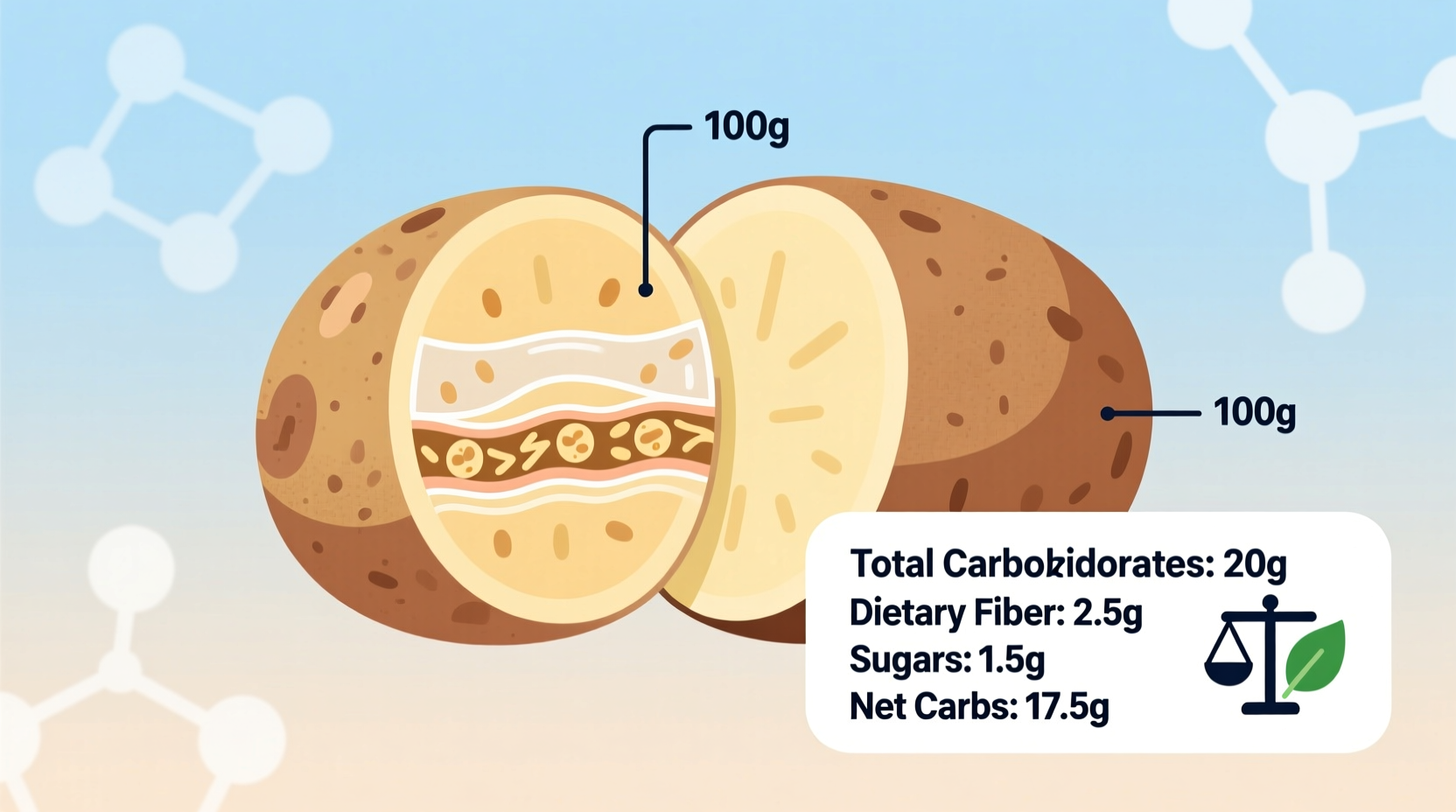Understanding exactly how many carbs are in a small potato is essential for anyone managing their dietary intake, whether for weight control, diabetes management, or athletic performance. This comprehensive guide delivers precise nutritional data you can trust, along with practical context to help you make informed food choices.
What Exactly Qualifies as a Small Potato?
Before we dive into carb counts, it's crucial to define what "small" means in potato terminology. Many people mistakenly assume all small potatoes contain the same carbohydrates, but size variations significantly impact nutritional content.
The USDA defines a small potato as approximately 138 grams (5 ounces) in its raw state. However, when you purchase potatoes at the grocery store, "small" can be subjective. A small potato typically measures 1.5-2.5 inches in diameter and fits comfortably in the palm of your hand.
| Size Classification | Weight (grams) | Total Carbohydrates | Dietary Fiber | Net Carbs |
|---|---|---|---|---|
| Small (5oz) | 138g | 25.7g | 2.1g | 23.6g |
| Medium (6.1oz) | 156g | 29.0g | 2.4g | 26.6g |
| Large (9.7oz) | 276g | 51.2g | 4.2g | 47.0g |
Source: USDA FoodData Central, ID 113912 (Potatoes, Russet, Flesh and Skin, Raw)
How Cooking Method Affects Carb Content
Many people don't realize that preparation method impacts the final carbohydrate count in your meal. While the total carb content remains relatively stable, water loss during cooking concentrates nutrients.
When you bake a small potato, it loses moisture but retains nearly all its carbohydrates. A small baked russet potato (about 138g raw) yields approximately 173g of cooked potato with 29.6g total carbohydrates. Boiling produces a similar effect, though slightly more nutrients may leach into the water.

Understanding Net Carbs in Small Potatoes
For those tracking net carbs (total carbs minus fiber), a small potato provides about 23.6g of net carbohydrates. The fiber content (2.1g) represents approximately 8% of the total carbohydrate count.
This distinction matters significantly for individuals following low-carb or ketogenic diets, where net carb counting is standard practice. While potatoes aren't typically considered low-carb foods, understanding the precise fiber contribution helps with accurate tracking.
Comparing Potato Varieties
Different potato varieties contain slightly varying carbohydrate amounts. Our data focuses on russet potatoes, the most common variety in the United States, but here's how other popular types compare:
- Russet (small): 25.7g total carbs
- Red potato (small): 24.3g total carbs
- Yukon Gold (small): 25.1g total carbs
- Sweet potato (small): 26.0g total carbs (with significantly more sugar)
These differences, while relatively minor, can be meaningful when tracking carbohydrates precisely. The USDA maintains these detailed nutritional profiles in their comprehensive FoodData Central database, which nutrition professionals reference for accurate information.
Practical Applications for Your Diet
Understanding how many carbs are in a small potato becomes valuable when planning meals. For context, the Dietary Guidelines for Americans recommend 130 grams of carbohydrates daily as a minimum for adults, though individual needs vary based on activity level, health status, and personal goals.
A single small potato represents about 20% of the minimum daily carbohydrate recommendation. If you're managing diabetes, the American Diabetes Association suggests working with a dietitian to determine appropriate carbohydrate portions for your meals, typically ranging from 30-45 grams per meal for many adults.
When incorporating potatoes into a balanced diet, consider these practical tips:
- Leave the skin on to maximize fiber content
- Pair with protein and healthy fats to moderate blood sugar response
- Consider portion size carefully if carbohydrate counting
- Choose boiled or baked preparation over fried options
Common Misconceptions About Potato Carbs
Several myths persist about potato carbohydrates that deserve clarification. Many believe potatoes contain "bad" carbs, but complex carbohydrates in whole foods like potatoes provide sustained energy and valuable nutrients.
Unlike refined carbohydrates found in white bread or sugary snacks, potatoes offer vitamin C, potassium, and B vitamins along with their carbohydrates. The glycemic index of potatoes varies by type and preparation method, but generally falls in the medium range (50-70), not as high as many people assume.
When Small Potatoes Fit Your Nutritional Goals
Despite their carbohydrate content, small potatoes can be part of various dietary approaches. Athletes often include them in pre-workout meals for sustained energy. Those following Mediterranean or DASH diets can enjoy them as part of balanced meals.
The key is understanding portion control and preparation methods. A small potato prepared with minimal added fats provides a nutrient-dense carbohydrate source that supports overall health when consumed as part of a varied diet.
Alternative Options for Lower Carb Needs
If you're seeking lower-carb alternatives while maintaining similar textures, consider these options:
- Cauliflower: 3g net carbs per cup (riced)
- Turnips: 4g net carbs per 138g serving
- Radishes: 2g net carbs per 138g serving (when cooked)
- Daikon radish: 3g net carbs per 138g serving
These alternatives provide similar textures when prepared properly while significantly reducing carbohydrate intake for those with strict carb limits.
Tracking Carbs Effectively
For accurate carb counting, weigh your potatoes before cooking. Raw weights provide the most reliable basis for nutritional calculations since cooking alters water content but not carbohydrate content.
Use a food scale and reference the USDA database for precise tracking. Many popular nutrition tracking apps pull data directly from this source, ensuring you get accurate information for your small potato servings.











 浙公网安备
33010002000092号
浙公网安备
33010002000092号 浙B2-20120091-4
浙B2-20120091-4